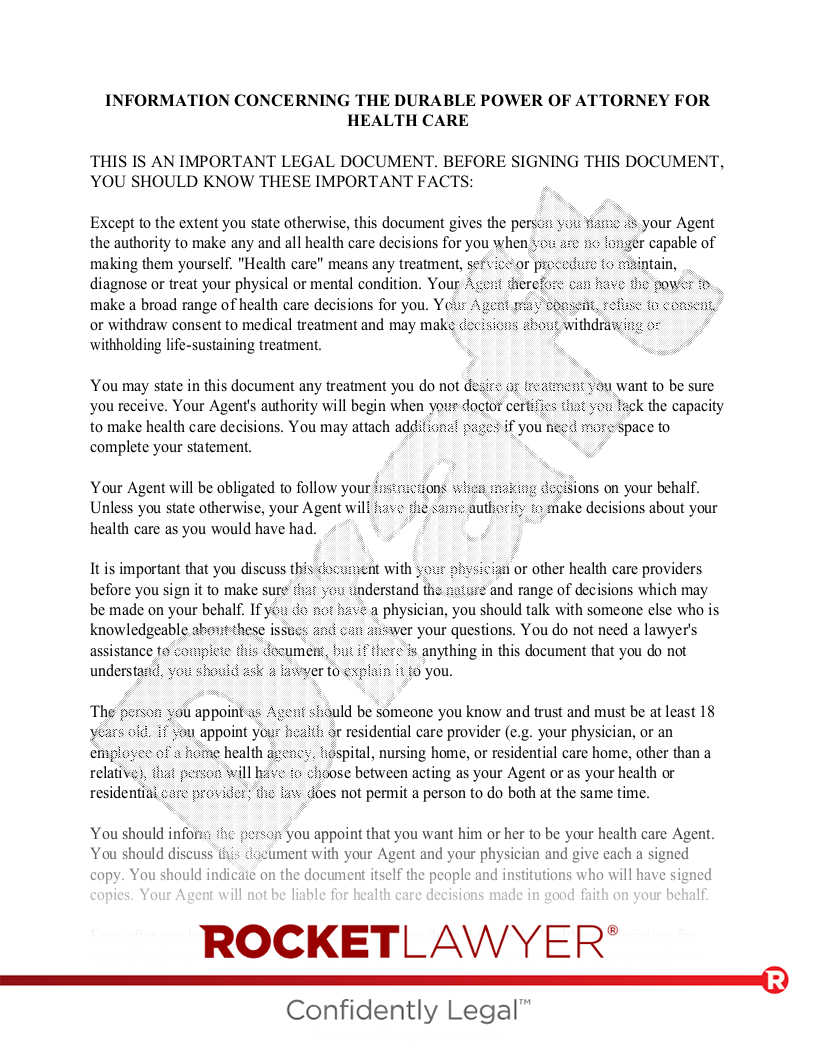Document end-of-life preferences in Vermont: Vermont Living Will

What is a Vermont Living Will?
The person making a Living Will is called the "principal," and the person or entity gaining authority to carry out the principal's wishes is called the "agent." Designed for Vermont residents, this Living Will can be used in Chittenden County, Bennington County, Caledonia County, and in every other part of the state. Each Vermont Living Will form from Rocket Lawyer can be completely personalized to address your specific circumstances. As a result of this official legal document, your medical facilities will have a record of your decisions, and your agent(s) will be able to offer confirmation that they have been given the authority to make choices for you when you are not able.
When to use a Vermont Living Will:
- You want to specify your wishes so that it is more likely they will be carried out.
- You are facing the possibility of surgery or a hospitalization.
- You have declining health.
- You have been diagnosed with a terminal condition.
Vermont Living Will FAQs
-
How do I write a Living Will in Vermont?
It's simple and easy to record your medical wishes using a free Vermont Living Will template from Rocket Lawyer:
- Make the document - Provide a few simple details, and we will do the rest
- Send and share it - Look over it with your healthcare agent or ask a lawyer
- Sign and make it legal - Required or not, witnesses and notarization are a best practice
This solution will often be notably more affordable and convenient than finding and hiring the average attorney. If necessary, you can fill out a Living Will on behalf of a family member, and then help them sign once you've drafted it. Please keep in mind that for this document to be considered legally valid, the principal must be mentally competent at the time of signing. If the principal is already incapacitated and unable to make their own decisions, a court-appointed conservatorship could be necessary. When dealing with such a scenario, it is important for you to speak with a lawyer .
-
Why should I write a Living Will?
Anyone who is over 18 should have a Living Will in place. Although it is challenging to acknowledge, there could come a time when you are no longer able to make your own medical decisions. Here are some common occasions in which it would be helpful to make or update your Living Will:
- You are currently managing a terminal condition
- You will be in the hospital for a medical procedure
- You are planning to live in an adult care facility
- You are getting older or have declining health
Regardless of whether this Vermont Living Will is being drafted as part of a long-term plan or made in response to a recent change in your health, witnesses and notarization are strongly encouraged as a best practice for protecting your document if its authority is disputed.
-
Do I need a lawyer for my Living Will in Vermont?
Making a Living Will is usually simple to do, but you could still need legal advice. Depending on whom you ask, some lawyers won't even agree to review documents that they did not write. A better approach to consider is to get help via the Rocket Lawyer attorney network. When you become a Premium member, you can request advice from an Rocket Lawyer network attorney with relevant experience or pose additional questions related to your Living Will. As always, Rocket Lawyer is here to help.
-
How much would it usually cost to make a Living Will in Vermont?
The fees associated with hiring the average law firm to make a Living Will might add up to between $200 and $1,000, depending on where you are located. Unlike the other sites you may come across, Rocket Lawyer offers much more than a Living Will template. If you ever require support from a lawyer, your Rocket Lawyer membership offers up to 40% in savings when you hire an attorney.
-
What steps should I take after I make my Vermont Living Will?
Alongside your Vermont Living Will form, you'll find discover a set of tips for what's next after your document is finished. You also can take any or all of these actions with your PoA: editing it, downloading it in PDF format or as a Word document, printing it, and signing it. Finally, your agent(s), care providers, and other impacted parties should receive copies of your final document. You may choose to file your document in the state's official registry , if desired.
-
Does a Living Will need to be notarized or witnessed in Vermont?
The rules and restrictions for Living Wills vary by state; however, in Vermont, your Living Will needs to be signed by two witnesses. Witnesses to this Living Will must not include your spouse, parent, adult sibling, adult child, or adult grandchild. As a basic principle, your witnesses must be at least 18 years old, and none should also be your agent.
